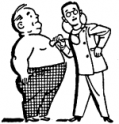Empiric
It only hurts when you quack, Doc.
Dear Word Detective: I just read “Rappaccini’s Daughter” by Nathaniel Hawthorne. Dr. Baglioni says of the ingenious Dr. Rappaccini, “But, let us confess the truth of him, he is a wonderful man! — a wonderful man indeed! A vile empiric, however, in his practice, and therefore not to be tolerated by those who respect the good old rules of the medical profession!” I found two definitions for “empiric”: (1) One who is guided by practical experience rather than precepts or theory, and (2) An unqualified or dishonest practitioner; a charlatan. How did the word “empiric” come to mean both “the layman” and “the shyster”? And does it have to do with what what my friend says, that all professions are a conspiracy against the lay? — Tania.

Sounds like an impacted deductible.
Well, I wouldn’t say that “all” professions are a conspiracy against laypeople. Many professions have oodles of actual substance and arcane knowledge not easily available to the average person, e.g., law, medicine, astrophysics, nuclear engineering, newspaper column writing, etc. There are, of course a few “professions” (“management consultant” springs to mind) whose practitioners are pretty obviously the modern equivalent of snake oil salesmen. But the problem with categorizing certain professions as fraudulent is, of course, that it is impossible to prove a negative. If I charge you big bucks, for instance, to wave a bowl of tapioca pudding over your head while I stomp on your toes, you can’t prove that I haven’t prevented you from being devoured by wolverines. And if I insist you give my bank five billion dollars to cover my bad bets, you can’t prove that you wouldn’t have lost more money if you’d refused. See how that works?
Meanwhile, the term “empiric” is closely related to “empiricism,” a philosophy of knowledge (aka “epistemology”) cooked up by the ancient Greeks. Empiricism maintains that all knowledge comes from actual experience perceived by our senses, rather than being innate in the human mind. In ancient Greece, this approach produced a group of physicians, known as the “Empirici,” who based their practice on personal experience rather than on medical theory and philosophy as it existed at that time.
The name of this group came into English as “empiric” in the 16th century, meaning a physician or scientist who relied on personal observation rather than established theory. Pretty quickly, however, “empiric” came to also be applied to those who relied on observation because they simply didn’t know the theories, i.e., untrained medical practitioners. These people often embraced outlandish theories of their own, and thus “empiric” soon became synonymous in certain quarters with “quack.” And by the 17th century, “empiric” was being used to mean “fraud, charlatan” in just about any field, not just medicine (“Such are the political empirics, mischievous in proportion to their effrontery, and ignorant in proportion to their presumption,” Coleridge, 1817).
While “empiricism” remains a respectable philosophy, I’m afraid that whatever virtue “empiric” once had has faded in modern usage, and today the word is for all practical purposes synonymous with “charlatan.” Simply being untrained (“lay”) in a profession doesn’t make one an “empiric,” of course. It’s pretending to be an expert that marks the true “empiric.”
Page 1 of 2 | Next page
